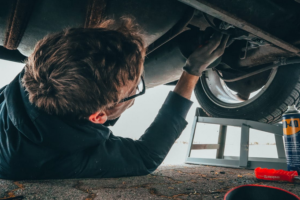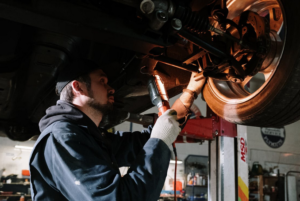If you’re like most people, you probably dread the thought of getting your vehicle inspected. It seems like such a hassle, and it’s hard to know what precisely the inspector is looking for. In this blog post, we will discuss some easy ways to pass your vehicle inspection with flying colors.
Ensure Your Car Is Clean Inside and Out
Before you even think about taking your car in for an inspection, you need to make sure that it is clean both inside and out. A clean vehicle will not only make the inspection process go more smoothly, but it will also give you a better chance of passing.
You don’t want the inspector to see a bunch of dirt and grime on your car, so take some time to give it a good cleaning before you head in. You can hire a professional to do this for you, or you can wash it yourself. Either way, make sure your car is sparkling clean before you go in for the inspection.
Check All Fluid Levels and Tire Pressure
 It will also be wise to check all fluid levels and tire pressure in your vehicle before taking it in for inspection. This includes oil, coolant, power steering fluid, transmission fluid, and brake fluid levels. You should also check the air pressure in all four tires. If any of these fluids are low or the tires are significantly under-inflated, your car will fail the inspection.
It will also be wise to check all fluid levels and tire pressure in your vehicle before taking it in for inspection. This includes oil, coolant, power steering fluid, transmission fluid, and brake fluid levels. You should also check the air pressure in all four tires. If any of these fluids are low or the tires are significantly under-inflated, your car will fail the inspection.
Replace Any Burned-Out Light Bulbs
Another way to pass your vehicle inspection is to make sure that all of your lights are in working order. This includes your headlights, brake lights, turn signals, and taillights. If any of these lights are burned out or not functioning correctly, be sure to replace them before your inspection. Although you can usually do this yourself, it’s always a good idea to consult with a professional if you’re not sure how to replace a light bulb.
Inspect Your Brakes for Wear and Tear
 Do not make the mistake of waiting until your brakes are completely worn out before you take them in to be serviced. If you do, you could be putting yourself and others at risk on the road. Regularly check your brake pads for wear and tear and have them replaced when necessary. This is something that is typically done during a routine vehicle inspection, but it’s always best to err on the side of caution.
Do not make the mistake of waiting until your brakes are completely worn out before you take them in to be serviced. If you do, you could be putting yourself and others at risk on the road. Regularly check your brake pads for wear and tear and have them replaced when necessary. This is something that is typically done during a routine vehicle inspection, but it’s always best to err on the side of caution.
Another important aspect of your brakes that you should have inspected is the fluid level. Brake fluid is what helps to transfer the energy from your foot on the pedal to the actual braking mechanism. If your brake fluid is low, it could impact your ability to stop quickly and safely.
If you’re looking to pass your inspection with flying colors, be sure to keep these tips in mind. By following our advice, you can avoid costly repairs down the road and ensure that your car is safe for the roads. Have any questions about the inspection process? Please leave us a comment below or contact us directly; we’d be happy to help.

